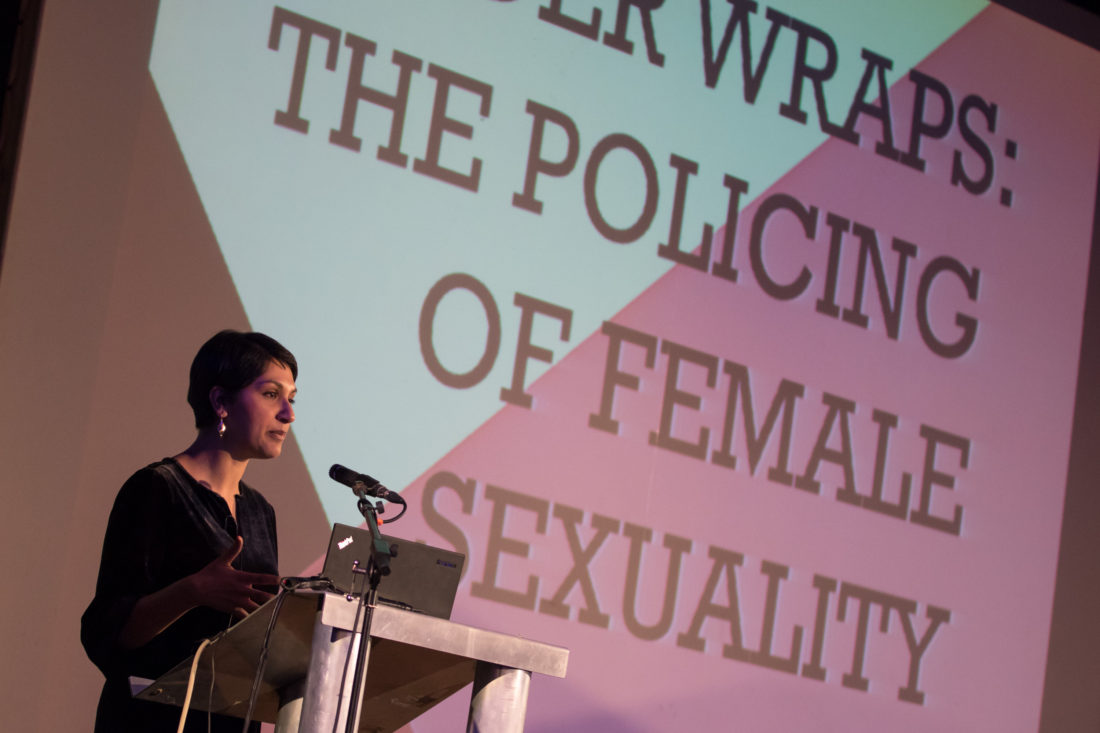
There was a large turnout at the Camden Centre in central London last night for the 2018 Rosalind Franklin Lecture, Humanists UK’s annual lecture celebrating the contributions of women towards the promotion and advancement of humanism across science, philosophy, politics, and human rights. This year’s lecture, given by science writer Angela Saini and chaired by broadcaster Samira Ahmed, was on the topic of ‘Under wraps: the policing of female sexuality.’ As per tradition, the Rosalind Franklin Lecture was timed to coincide with International Women’s Day on 8 March.
Angela’s lecture explored social and cultural expectations of women, as well as discrimination women face, through the lens of one fascinating historical question: why is ‘sexual modesty’ – the quality of being demure, chaste, or in some way virginal – so prized for women in particular? From this opened up a deeply informed historical exploration of the ways, across history and across cultures, that women’s bodies have been policed and regulated by religious and cultural authorities. Modesty culture, argued Angela, represented the emergence of a pervasive patriarchal norm that limits women’s options in life and enforces assumptions about men and women that are entirely unsupported by science.
Audience members heard that patriarchal norms about women’s bodies, as well as the supposedly differing natures of male and female sexuality, did not exist in the same way even as recently as 10,000 years ago. Where historical evidence allows us to peer this far back in time, it would appear that early hunter-gatherer societies were in fact much more sexually fluid, with neither the strict adherence to monogamy nor gendered behavioural roles seen across the world today. These developments, it would appear, were linked to the accumulation of wealth and property in a post-hunter-gatherer societies; women’s bodies, too, became commodities, Angela posited. The practice of female genital mutilation, ‘which exists for no other purpose than to deny women pleasure from sex,’ said Angela, represented the extreme end of this kind of behaviour: denying women ownership of their sexuality and treating them as objects to be exclusively possessed by men.
The talk also touched on the ways in which religion has been party to the propagation of a patriarchy. In different cultures all around the world, veiling norms for women emerged which were used as markers of social esteem and respectability; in ancient Assyria, for example, slaves were not permitted to wear the full-face veil expected of other women, thereby reinforcing the desirability of being veiled, modest, and subservient to men. In the modern world, the veil has recently become more widespread, despite fierce protests against it from feminists in Muslim-majority countries just a generation ago. This renewed popularity is more seen in Muslim communities in Western countries than in Muslim-majority countries. Social pressure to wear the veil is high, said Angela, for Muslim women in the UK: ‘If covering her hair marks out a woman as more respectable, where does that leave the woman who doesn’t? Those who don’t veil are being, in a sense, tainted by their decision not to wear a marker of social respectability.’
More concerning still was the growing politicisation of the veil, which has led to combatants in a modern-day culture war taking extreme sides and inflaming one another over the veil; attacks against Muslims by far-right activists are dissuading liberals (on both the right and left of politics) from speaking out against the imposition of the veil on women who do not want it, including girls as young as four or five being made to wear the veil to school. The consequence of this was that Muslim feminists, and other women who don’t want to wear the veil, feel increasingly isolated. It was obviously wrong, Angela said, that girls are being made to wear a symbol of sexual chastity and modesty before they are old enough to make an active choice for themselves.
What, then, can we do to support the empowerment of women? Angela offered a call to action, but no easy solutions. Issues like the veil demonstrated a very urgent need to fundamentally rethink and remodel the way we our societies think about women’s sexual behaviour. One way we could do that, she suggested, was by choosing to celebrate women for things other than their ‘modesty’ or the way they dress: to celebrate them for their achievements. But it was also necessary for Western liberals to practice the difference of respecting someone’s free choice without going so far as to embrace or celebrate those choices, as in the case of the veil – which remains, inescapably, a symbol of patriarchal religious modesty culture. ‘‘Rather than celebrating the veil, like the fashion industry is doing at the moment, we should be spotlighting feminist activists – like the brave women in Iran today who are throwing off their veils. We can respect choice without celebrating it. As liberal feminists we are free to choose our icons.’
Notes
At Humanists UK, we advance free thinking and promote humanism to create a tolerant society where rational thinking and kindness prevail. Our work brings non-religious people together to develop their own views, helping people be happier and more fulfilled in the one life we have. Through our ceremonies, education services, and community and campaigning work, we strive to create a fair and equal society for all.
Named after the pioneering English chemist who helped uncover the unique double helix structure of DNA, the Rosalind Franklin Lecture was established to recognise and celebrate the contribution of women in humanism – whether through achievements in science, philosophy, or the promotion of democracy and human rights. It is held on International Women’s Day (8 March), or as close as possible, and forms part of the BHA’s annual lecture series, which also includes the Darwin Day, Voltaire, Holyoake, Blackham, and Bentham Lectures. Previous Rosalind Franklin Lectures were given by Professor Dame Anne Glover and Professor Sarah-Jayne Blakemore.
Humanists UK recently changed its name from the British Humanist Association: https://humanists.uk/2017/05/22/bha-becomes-humanists-uk/
